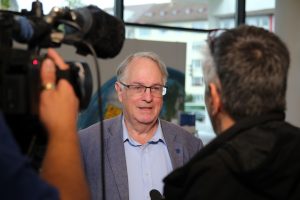
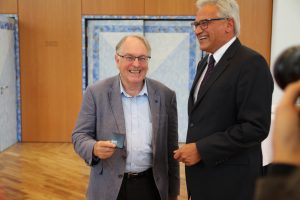
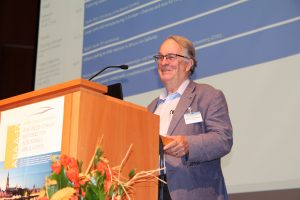
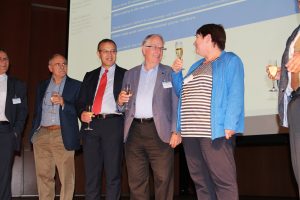
The Ulm Battery Conference ABAA12 (Advanced Lithium Batteries for Automobile Applications) was drawing to a close as the message from Stockholm spread in the audience. A conference participant had just been awarded the Nobel Prize on the same morning.
Spontaneous jubilation, standing ovations and applause for the newly awarded winner: M. Stanley Whittingham – who himself had been informed of his award just a few minutes earlier by a telefphone call – sat calmly in the audience of the ABAA12 conference, when the news went around the world. He was honored with this year’s Nobel Prize for Chemistry at 11:45 am with John B. Goodenough and Akira Yoshino for inventing the lithium-ion battery.
Stanley Whittingham was considered one of the earliest lithium battery researchers worldwide. These lithium-ion batteries are today in almost all portable electrical appliances, e-cars and stationary storages. His personal research contribution was a whole series of material innovations: Not only were the lithium batteries much lighter than their predecessors, they could also be re-charged and discharged many times.
Whittingham developed the first functional lithium battery in the early 1970s. Goodenough was responsible for the development of much more powerful batteries. Yoshino in 1985 produced the first commercially available lithium-ion battery.
The ABAA12 Conference is an international conference with changing venues on every continent. The conference was hosted by Margret Wohlfahrt-Mehrens (ZSW), Prof. Stefano Passerini (HIU) and Dr. med. Khalil Amine (IALB / Argonne National Laboratory, USA).
The ABAA12 conference is unique compared to other congress formats. The ABAA12 provides a substantial connection between science, industry and politics. Around 380 participants from 30 nations – including renowned scientists, policymakers and representatives of the automotive industry – debated over four days on current trends of lithium-ion batteries.

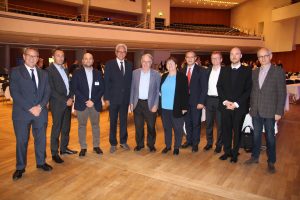



12. – 16.05.2013
Karlsruhe, Deutschland
Die zweite Konferenz für Materialien für Energieanwendungen findet 2013 in Karlsruhe statt. Die Themenfelder erstrecken sich über das Thema Energiewandlung, Energiespeicher, Transport, Effizienz und die fundamentalen Aspekte.
18.11.2019, 4:00-6:00 PM
The Bundesverband der Mittelständischen Wirtschaft (BVMW) and the Projektentwicklungs-GmbH Ulm (PEG) invite local managers of small and medium-sized enterprises to the event “Business meets Science” at the Helmholtz Institute Ulm (HIU).
Venue:
Helmholtz Institute Ulm
Electrochemical Energy Storage (HIU)
Helmholtzstraße 11
89081 Ulm
Event-Flyer
Registration:
Mr Karl-Heinz Raguse
6.6.2018, 8:45 Uhr
ITAS, Karlstr. 11, 76133 Karlsruhe
Das Recycling gegenwärtiger Li-Ion Batterien ist aufwendig und zum Teil mit erheblichen Kosten und Umweltauswirkungen verbunden. Ferner können (je nach Recyclingtechnologie) auch nur ein Teil der Wertstoffe wiedergewonnen werden. Jedoch wird ein möglichst vollständiges Recycling aufgrund der Endlichkeit mineralischer Ressourcen und der teils hohen Umweltbelastung aus der Rohstoffgewinnung als zentral für eine positive Umweltbilanz von Batteriespeichern gesehen. Unabhängig davon werden gegenwärtig einige post-Lithium Speichersysteme entwickelt, über deren prinzipielle Rezyklierbarkeit noch sehr wenig bekannt ist. Soweit sich die Technologieentwicklung an der Verwendung kosten-günstiger Materialien orientiert, kann dies zu geringen wirtschaftlichen Anreizen für ein Recycling führen. Auf der anderen Seite gibt es emergente Batteriesysteme, die auf Reinmetall-Elektroden basieren, welche ein stoffliches Recycling nennenswert begünstigen.
Workshop und Expertenforum
Der eintägige Workshop bringt Experten aus verschiedenen Disziplinen und Institutionen wie Forschung, Industrie oder Politikberatung zusammen. Diese diskutieren unternehmerische Aspekte, Regularien, potentielle Umweltauswirkungen sowie die mögliche Anwendbarkeit gegenwärtiger und zukünftiger Recyclingverfahren auf die verschiedenen Batterie- und Zellchemien. Neben etablierten Li-Ionen Batterien werden dabei auch vielversprechende neue Zellchemien wie z.B. Li-Ion Festkörper, Na- Ion oder Mg-Ion Batterien betrachtet. Auf dieser Basis sollen dann erste Grundsätze für einen recycling-freundlicheren Aufbau von Batterien und potentielle Regeln für ein „design for recyclability“ im frühen Entwicklungsstadium entworfen werden.
Ziele
28. – 29. Oktober 2014
Ulm, Deutschland
GREENLION ist ein breit vernetztes, europäisches Forschungsprojekt aus dem „7th Framework Programme for Research and Technological Development (FP7)“ der EU, welches zum Ziel hat, die Herstellung von Lithium-Ionen-Batterien für die Elektromobilität “grüner” und günstiger zu gestalten.
23. – 26. März 2014
Bad Honnef, Deutschland
“Analytical Tools for Fuel Cells and Batteries”
Ein Workshop organisiert von:
Dr. Roswitha Zeis (HIU, Helmholtz Nachwuchsgruppe)
Prof. Dr. Helmut Ehrenberg (KIT, IAM-ESS)
Prof. Dr. Christina Roth (Freie Universität Ulm)
Dieses Seminar ist gefördert durch die WE-Heraeus-Stiftung.
13. – 14. Juli 2013
Barga, Italien
Mit Beteiligung von Prof. Maximilian Fichtner fand im Juli 2013 die Gordon Conference “Hydrogen Interactions in Energy Storage” statt. Es wurden Vorträge und Poster präsentiert.
3. – 7. Juni 2013
Ulm, Deutschland
Die PBFC-6 führt die halbjährlichen Konferenzen weiter, welche 2003 in Jeju Island gestartet wurde. Die Konferenz bietet ein Forum für neue Fortschritte im Themenfeld Energiewandler und Energiespeicher.
19. – 20. März 2013
Bad Boll/Stuttgart, Deutschland
Die ModVal 10 ist das 10te Event aus einer Serie jährlicher, internationalen Symposien für Brennstoffzellen- und Batteriemodellierungen sowie deren experimentellen Validierung.
The Federal Minister of Education and Research, Anja Karliczek, visited Ulm on Monday, 15th July 2019 and got an idea of the battery research at the location. She emphasized the further expansion of Ulm’s broad expertise in production research and future battery concepts.